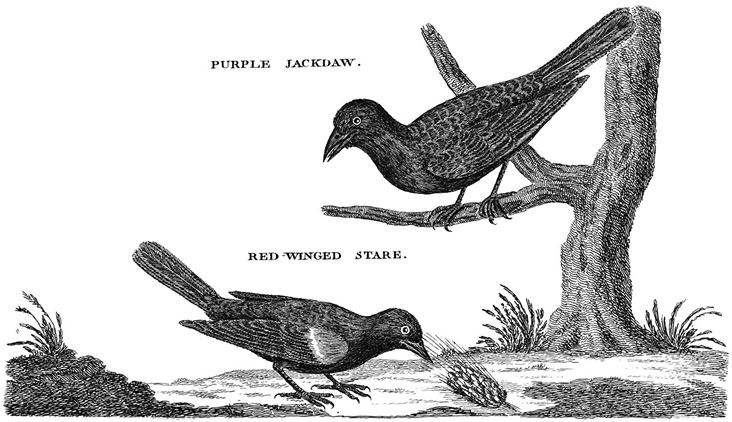Peter W. Oehlkers

Illustration of the “Purple Jackdaw” (Common Grackle) and “Red-winged Stare” (Red-winged Blackbird) from Peter Kalm’s Travels into North America. Source: https://www.gutenberg.org/ebooks/72103.
In the spring and early summer of 1749, Massachusetts experienced one of its worst droughts of the century. Hay fields burned, fruit trees died, and farm animals were threatened with starvation. Stories appeared in Boston area newspapers describing how lakes and creeks had dried up. The Neponset River in Dedham was apparently so warm it was uncomfortable to enter. To make matters worse, grasshoppers and caterpillars devoured the few plants that remained.
The drought was widely considered an act of Providence, a rebuke to the sinful nature of humans. The governor of Massachusetts declared a day of fasting and humility on June 15, 1749, and then a day of Thanksgiving on August 24, 1749—commemorated in a famous printed sermon by Thomas Prince (1750)—after the eventual return of rain. Some commentators, however, had a different perspective on Providence. They thought some of the loss might have been avoided if towns in Massachusetts had not put bounties on blackbirds.
Laws providing for the destruction of blackbirds—Common Grackles and Red-winged Blackbirds—in colonial America are well-documented. Continuing the tradition of Tudor-era bounty laws in England, some Massachusetts towns, for example Lynn as early as 1697, required households to destroy a certain number of birds each year or be penalized (Lewis 1829, p. 144). Other towns offered cash rewards.
To view the rest of the article you'll need to
subscribe. Bird Observer publishes original articles on birding locations, on avian populations and natural history, on regional rarities, field notes, field records, photographs, and art work.